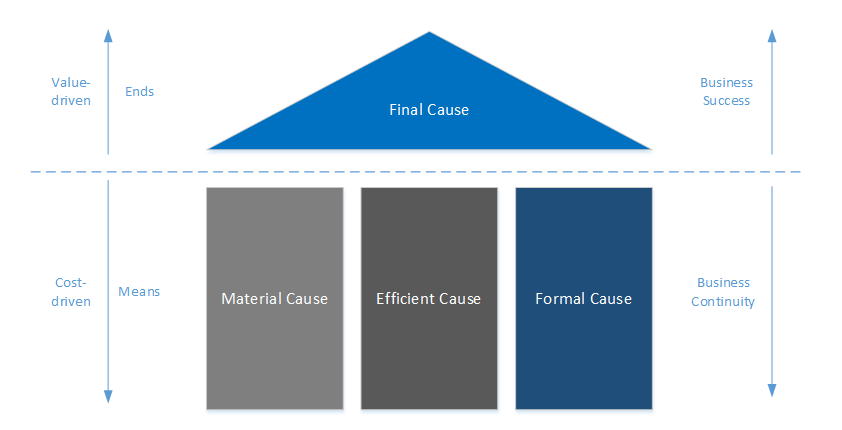The Four Causes of Technology
Aristotle, in his work The Metaphysics, enumerates a number of “causes” which describe the essence of a thing. Your business’s technology is a thing. If we want to gain a good understanding of what this thing is, then we should be able to describe this thing–in its essence–we should be able to articulate each cause in order to accurately capture what it is, precisely, that we’re dealing with, whenever we talk about technology.
Formal Cause
First, the formal cause is the design or template on which the thing is based. Perhaps it takes the “paper form” of a diagram or blueprint. Some of the written rules and policies around how to treat and use technology are also part of this cause.
Material Cause
Next, there is the material cause—what is the technological stuff made out of? Routers, switches, cables, wireless access points, devices of all kinds, software and so forth—some of them are in your network closet, some are in the hands of employees, while others live in a datacenter far, far away—all of them are material causes.
Efficient Cause
Now, in order to assemble the materials according to the blueprints, we need another cause to actualize the technology—the efficient cause. Your service providers, software programmers, hardware manufacturers, your network administrator or technical IT team and all of their combined efforts are all part and parcel of the efficient cause.
Final Cause
What is the final cause? We’ve already covered computers, software, mobile devices, servers and everything that makes them run, haven’t we? What else is left?
We don’t usually look at “final causes” or “purposes” in modern science, because modern science tends to concern itself more with material and efficient causes than anything else—to imagine that things, in and of themselves, might have “purposes” almost presupposes (in natural science) unsavory ideas like an intelligent creator, which modern scientists cannot tolerate. So we tend to ignore them, even beyond the boundaries of natural sciences, this thinking is habitual.
In short, purposes cannot be proven, studied or predicted the way other causes can. Scientists will seek to understand the means of a thing to no end through dissection, observation and experiment, but they generally ignore any apparent ends.
Likewise, your Technology service providers tend not to look beyond the means—the material and efficient causes they work with. The most advanced among them might be quite proficient in the first three, but very seldom do we see technology providers working at your level—the business level—the human level.
Figure 1. The house that technology built
But what is the final cause—what is the end of technology, and just why are these “technological things” in existence to begin with?
If your service provider can address the formal and material causes, and through their efforts provide the efficient cause, then they have done an exceptionally good job of providing you with exactly one thing: an infrastructure. The first three causes of technology provide what we term “Business Continuity”— you require this stable, secure and responsive platform on which you will presumably do your “technology-assisted work.”
Now the typical assumption of a service provider is that the rest (how to be successful with it) is up to you to figure out. “Business Success” is the final cause of technology—it is the end—the whole reason you have technological “stuff” to begin with, and I argue we usually pay too little attention to it.
The end of technology is enhancing your work
The end or purpose of technology—to bring increased efficiency and greatness to your work—to help you be successful, is the value of technology, whereas everything else we can describe about it merely represents costs.
Costs are easier to work with and understand—they represent non-abstract, real-life nuts and bolts—e.g. materials and labor—that relate to dollar amounts. But technology does not have its essence in the nuts and bolts alone. It has a more abstract, non-material existence as well—the final cause or end of enhanced productivity—the work that you do every single day. How easily we lose sight of this simple fact!
Since it is abstract and immaterial, the end is easy to overlook. We think that having the nuts and bolts, the outward stuff of technology, means that we are automatically being more productive. If you have the right people, and the right tools, you get to have success, right?
Wrong. Dead wrong. We need to understand how to be successful using the technological tools before the essence of technology can be realized in our businesses. Even before you begin using technology, the end requires that you define what success means to you and your business in advance. You need to define your business objectives, and on top of that, you need to make sure that your technological choices—the nuts and bolts that you purchase and put into order with the help of your service providers—are “tuned” or aligned to these objectives.
The end or purpose is what drives value for your business. Everything else is cost-driven—not one bit or byte of it will add value to your organization in and of itself. There is no such thing (as the marketing will have you believe) as “plug-n-play” technology. You need to bring the purpose of technology to life. All the magic of technology comes from how you put it into use in your techne—your art, your craft, your skill, your trade.
So why don’t the service providers of technology do more to drive appropriate, end-oriented, business-enhancing use of the products they sell? Probably it is just systems myopia. You may find that you need to employ application specialists and other consultants, in addition to your technology service providers, so that you can learn what the tools are capable of, and gain advice about how best to use them in your particular business, in order to drive the results that you are looking for.
How do you achieve the ends in your business? Is this topic something that you think needs more attention? Are you using technology yet, properly speaking?! Or are you merely fumbling around with technological stuff?





Leave a Reply